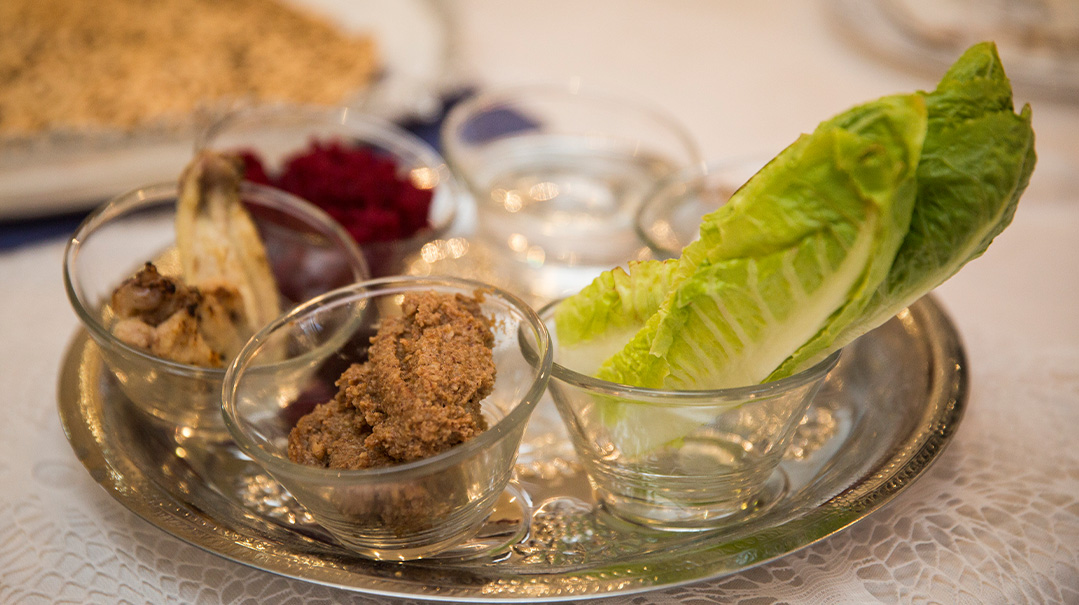Hearts in the Air
| October 17, 2023At a wedding amid war, joy and terror intermingle

2:31
“How is Ahron* holding up?” I’m speaking with my sister-in-law Dini about her son who is here in yeshivah.
“He’s nervous. A couple of boys from his yeshivah are going home,” she tells me.
“It’s really stressful. I thought I was used to this, but this is worse than anything I ever experienced in all my years here.”
“Should I bring him home?” she asks. “I wasn’t planning to.”
“If he’s not asking to go home, I wouldn’t offer. It’s scary but under control.
“If he was in the south, I’d say get him out of there, but in the center, the main danger is the bombing and baruch Hashem, baruch Hashem, the Iron Dome has a close to perfect record of shooting those down. The few that get through are usually in the south, which gets such a heavy barrage that it sometimes overwhelms the system.”
5:01
The siren starts to wail. After over 50 uneasy hours of silence in Beitar, of constantly listening for the dreaded rise-and-fall, it’s no surprise.
I run toward the back of the house while taking inventory of my family.
Only my husband and one daughter are home.
I’m pretty sure my boys are with friends nearby who have apartments with a safe room, but my 13-year-old went with her friend to buy essentials to send to the soldiers.
Is she still in the makolet? Do they even have a safe room? Was she on her way home? Will she have the presence of mind to go into the closest building and not try to get home? Is she terrified? Why did I think it was a good idea to send her shopping????
My stomach is clenching in panic. My husband slams the heavy metal window shut. We murmur Tehillim.
Another siren.
And suddenly, the horrible thunderous sound of a missile landing. A high-pitched screaming explosion. The window rattles.
Another siren. And another explosion.
We look at each other in white-faced disbelief. Struggle to talk. To calm our pounding hearts.
This isn’t supposed to happen.
The house phone rings. It’s too soon to go out. My cell phone rings. I’d forgotten to take it in with me.
Is it my daughter? Or maybe my youngest? Is he not playing at his friend’s house like I thought he was?
My cell phone rings again. My husband races out and answers.
It’s my younger son. He’s fine.
No word from my daughter.
5:12
We emerge from the sealed room and rush outside. There’s a plume of smoke rising from a street further up the hill.
“Direct hit,” my upstairs neighbor says grimly. She’s on the porch above our garden. “No one killed, baruch Hashem, but seven wounded.”
We struggle to make sense of this.
I walk back into the house. Three huge bags of succah decorations are still on my table.
5:14
My daughter hurries into the house laden with heavy bags.
I hug her tight, wanting to never let go.
“Where were you?”
“We were still in the makolet,” she says with a laugh. That high-pitched, unnatural laugh you use when you’re stressed but trying to convince yourself that everything is okay. “And then we heard the siren. They have a sealed room there. Well, I think it’s a sealed room. Maybe it’s just the walk-in fridge.
“Look at all the stuff we got!”
I exclaim over the instant soups, tell her how much the soldiers will appreciate the shampoo, toothpaste, coffee, and canned goods. I tell myself that we’re fine, that everyone is safe.
I don’t feel safe.
5:32
I’m on a chair, going through the top shelf of our closet. I like to always be prepared; I’m one of those people who needs a spare everything. But now, I’m raiding my stash.
I pull out an eight-pack of Hanes undershirts, a six-pack of thick dark socks, a package of tube socks. I think of exhausted, battle-weary soldiers, and I’m grateful there’s some tiny thing I can do.
We bag the clothing, put it together with the food, and my husband brings it to the neighbor who is arranging deliveries to the south.
6:05
My brother-in-law in Flatbush sends us a link to an article about the missile hit in Beitar. We stare at the image.
We recognize the place instantly; it’s a minute’s walk from my husband’s kollel.
“I passed that spot twice today,” he says in a whisper.
6:32
We have a chasunah tonight. The Nadels have been our friends and neighbors for more than two decades. They’ve married off several sons, but this is the first daughter getting married.
The night before we’d gotten an email informing us that after consultation with our rav they were told to proceed with the wedding as usual.
I’m patting on foundation, dabbing on lipstick, lining my eyes in navy blue, while feeling ridiculous. We’re at war! Who cares about mascara?
But it’s a chasunah; I want to treat it like the simchah it is.
7:23
As we leave the house, I call my teenage son to tell him about the leftovers he can have for supper.
“I’m fine, I’ll find food,” he tells me. His voice is subdued.
Then, “Mommy, one of the people injured was Menachem Gold’s mother.” Menachem has been his friend for five years.
“What? How? Where?”
“She was on a bus when they heard the siren. They got out of the bus, but the rocket landed near them. There’s shrapnel in her leg. She’s in the hospital now.”
“How is she?”
“I don’t know. Menachem was too hysterical to give me any details.”
“Please get her name so we can daven,” I tell him. “Stay safe.”
As though it’s something we can control.
7:45
We enter the large hall and we’re greeted with the strains of soft music. They’re in the middle of the badeken.
I look around. Breathtaking gowns, freshly set sheitels, glittering smiles. The tables are set beautifully, gold tablecloths, cloth napkins fanning out from glass goblets. It looks like every other wedding.
Only when you get closer, when you lean in for an air kiss, do you see the bloodshot eyes, the furrows on the forehead.
We head outside for the chuppah.
There’s a young chassidish singer who sings one heartfelt melody after another.
Lachen shafachti sichi… batuach ani b’eileh….
All around, women are swaying as they use this momentous time to send up heartfelt pleas. There’s a hushed intensity laced with tears. Beside me, a friend covers her face with her hands, bows her head, and begs Hashem for mercy.
Krias hakesubah.
Im eshkacheich Yerushalayim….
The singer lingers on the words, people close their eyes, and you can sense the weight of our endless galus.
A shattered glass.
Sheva brachos.
And then crashing drum and a joyous Od Yishama. A radiant chassan and kallah, exuberant dancing.
I go to wish my friend mazel tov.
Her hug lasts a moment longer than usual. “Thank you so much for coming,” she says. “Every person means so much right now.”
We reenter the hall, wash and sit down. The Nadels are popular and well liked; there are so many set tables. But most of them are empty.
“How are you holding up?” I ask my friend Becca as we nibble cabbage salad.
“My daughter’s anxiety is through the roof,” she admits.
We talk about teenagers and fears and how we parents can help our children remain grounded when the ground seems to be disintegrating beneath our feet.
I walk across the hall and meet my friend Shalva. Her son is an officer in the army.
“Shalva,” I say, “I can’t imagine—”
“I’m one of the lucky ones,” she tells me. “Because he’s an officer, he has to have a phone on. He texts me every six hours: ‘Ani beseder.’ But he had to take the phones of the 30 boys in his brigade; if the Arabs see too many phone signals in one place they can target it. I can’t imagine what those mothers are going through.”
“Where is he?” I ask.
“He’s down south,” she says. I grimace. “But his brigade is still in training — they can’t fight yet. They’re manning the bases. It’s his friends, the ones who were in his original brigade, who are on the front.”
There’s nothing to say.
Shalva tells me that after the second siren on Simchas Torah, her son turned on his phone and discovered he needed to report for duty immediately. “That was nine o’clock. By eleven, they had sent in buses and picked up every soldier in Beitar.
“I’ve been sleeping in my clothing,” she says. “How can I be comfortable when my son is in the field?”
A waitress passes by laden with a tray of blintzes.
“It’s so terrifying,” I say.
“I am terrified,” she says. “And I’m so proud. He didn’t need to do this — he’d finished his service. But he signed up for another two and a half years because he wanted to help protect our country.
“I was doing the laundry yesterday and there was his uniform.” Shalva’s voice breaks. “I just buried my face in it and cried. I begged Hashem to let him come safely. To let all of them come home safely. Every one of them is a son, a husband, a father….”
8:35
A crash of cymbals, a burst of music. The chassan and kallah are about to make their grand entrance.
The kallah was in shidduchim for several years; most of her friends are married. Few of them were able to brave a trip to Beitar. Instead, younger local girls, friends of the kallah’s sister, are holding the multicolored arches. The kallah runs through the arches with her mother, with her mother-in-law, and then we’re all dancing.
With the absence of so many, there’s no standing on the side and doing the polite I’m-past-the-age-for-energetic-dancing-so-I’ll-stand-here-and-clap routine. Nearly every woman in the hall is whirling in the concentric circles surrounding the kallah.
9:36
The first dance finished, I check my phone. Missed calls from my married daughter. I call her back.
She confirms what we discussed earlier in the day. She, her husband, and my grandchildren will be moving in at least until after Shabbos.
“Your kids are bored, my kids are bored,” she tells me, “they’ll entertain each other.”
I laugh and eagerly agree, relieved that she’ll no longer be in a settlement in the south in a home with no sealed room.
Although I now know that Beitar is no longer safe either. That warning systems and Iron Dome are enormous brachos but not infallible.
I’m eating my rice-filled chicken cutlet and green beans when my close friend Ashira slides closer to my seat.
“Want to hear some more good news?” she asks in a wry tone that warns me that I probably don’t want to hear this, but that it’s also inevitable.
“I guess….”
“I just heard from two different people that the Home Front is instructing all citizens to have enough food and water for 72 hours.”
I stare.
“Yeah, pretty crazy,” she says.
Two minutes later, Tzirel walks in. I’d seen her at the chuppah, and then she’d vanished. She looks harried.
“Did you hear?” I ask.
She nods somberly. “Actually, that’s why I was gone for the past hour. My daughter called one of the news hotlines and heard the warning. We don’t have that much food in the house and she was panicking.
“So we headed downstairs.”
There’s a large supermarket on the ground floor of the building that houses the hall.
Tzirel takes a deep breath. “You can’t imagine what’s going on down there. Craziness. Panicked people emptying the shelves, trying to buy whatever food they can find.
“And then I come up here, and….” She gestures at the elegant ambiance, the muted conversation and soft music. “It’s like alternate universes.”
Am Yisrael lo mifached the band starts to play. I don’t know if I should laugh or cry.
I call my husband, who had left earlier.
“Are you home? Can you see if the makolet is still open? Oh, and please fill every bottle we have in the house.”
I return to my chicken, but no longer have an appetite.
Then the pianist plays a glissando and the low rumble sounds eerily reminiscent of the start of the siren’s wail. I jump, realize my mistake, and try to settle back in my seat. Across the room, half a dozen women do the same.
And then there’s pounding music and again, we’re flying in joyous circles, jumping, forming a train and snaking through the hall.
Someone brings out an enormous white parachute, and the kallah and her mother dance in the center. Her sisters join. We lift and drop the fabric so it forms billowing waves around them.
Her mother and sisters duck under the cloth and leave. Her mother-in-law and sisters-in-law take their place. They sway together, pose for a picture, beaming.
Then, they too leave, and it’s just the kallah in the center. The undulating cloth creates a strong breeze and her filmy veil rises and falls, rises and falls. She twirls, arms outstretched, white veil, white gown, white parachute, everything pure and pristine and innocent.
Downstairs desperate people empty shelves of water and canned goods.
Down south there are hundreds of hundreds of thousands of soldiers massed on the border, while Hamas rains deadly rockets upon our country.
But here is an island, a place where the future gleams with hope, where Jews do what they’ve always done: continue to build, to create new homes and new generations.
Someone hands the kallah a huge bag filled with red hearts. As we pulse the parachute around her, she tosses them upward. They soar, surround her, flutter softly downward. Then, another pulse, and they’re soaring high again. Again and again, we lift the white fabric, and the hearts dance.
Then, it’s over, the fabric gathered, and the kallah goes to the chassan’s side, where one of his friends is tossing silver juggling pins.
11: 18
I retrieve my bag, check my phone. Seven missed calls, four from my husband.
“What’s wrong?” I ask breathlessly.
“Finally!” he says. “I’ve been trying and trying to reach you. The makolet is still open. I filled a cart with a bunch of stuff. What else do we need?”
The music is so loud. I can’t hear him and he can’t hear me. I step out of the hall for a minute.
“Eggs, lots of eggs,” I say.
“All gone.”
“Water, at least two six-packs.”
“All gone. I got some flavored water; figured it’s better than nothing.”
I take a deep, steadying breath. “Potatoes.”
“Got the last bag.”
“Milk.”
“There hasn’t been milk all day. I got cottage cheese and butter.”
“Canned goods.”
“I got lots of tuna. What else?”
“Pickles. Olives. Baked beans.” I think of my grandsons. “Applesauce. Rice. Crackers. Maybe lentils?”
In the background, the music plays on. I try to think of what we may need if we have no access to outside food. Of what I’ll feed three generations of people I love if we’re trapped in our homes.
I don’t want to think about this.
“Tissues. Paper towels. Toilet paper.”
“I got all that.”
“Flour we have, but sugar and oil we need.” And on it goes. Finally, we’re done. Although I’m uneasy, sure I’ve forgotten something essential.
Back in the hall, I watch the chassan’s friend twirl a baton. He rides a unicycle. And then there’s a final fast song.
The music becomes plaintive, and everyone drops to the floor for a kumzitz.
Rachem, rachem na Hashem elokeinu….
Some girls link arms. Others sway.
I try to find a ride home.
Ten minutes later, Ashira is ready to go. She has room for me in her car. We do a last round of kisses and mazel tov wishes, then exit the brightly lit hall.
A red heart floats after us as we step into the black night.
*All names have been changed
Please daven for Ronit bas Mazal, Menachem’s mother, and Nosson Tzvi ben Chaya Esther, a ten-year-old boy badly injured in the Beitar missile hit.
(Originally featured in Family First, Issue 864)
Oops! We could not locate your form.







